| |
|
|
Books
|
|
|
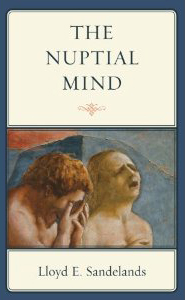 Synopsis Synopsis
The
Nuptial Mind
is about the coincident decadence of mind
and sexuality in American society today,
particularly on the university campus. Lloyd
E. Sandelands argues that this decadence
owes to a contemporary blindness to the
theological precept expressed in Biblical
revelation that God created Man in His
image, as "male and female in one flesh."
The book advances the "nuptial hypothesis"
that the human mind reaches its greatest
heights of creative realism when its male
and female aspects are integrated in the
image of God.
The Nuptial Mind
explores the theology of the body outlined
by the Catholic Church.
Review:
"Sandelands
demonstrates the depth of his theistic commitment in
this meticulously argued book. Drawing on the
contrast between contemporary conceptualizations of
the university mind, which he maintains are rooted
in intellectually and morally empty world views, and
Christian sensibilities, he offers several new and
significant contributions. The center of his
argument is the unity of man and woman in marriage,
where mutual love becomes the basis for a nuptial
mind, and along with the love of God and others, is
modeled on the image and likeness of God. The
foundation for such a role of the nuptial mind
inheres in a faith that is based, not on scientific
materialism or post modern emotivism, but rather on
truth and one's personal and shared mental actions
in relation to God. Such a fealty to truth is a
faith-based belief and has practical implications;
it is ultimately justified by, and expressed in,
moral commitments to mankind and God."
—Richard
P. Bagozzi, Dwight F. Benton Professor of Behavioral
Science in Management, University of Michigan
|
|
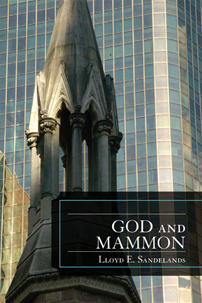
Synopsis
In many parts of today's
global economy, the moral foundations of society are being tested by a
business culture that is given to the good of business owners, rather
than the good of the human person and society. The widening gulf between
business economics and ethics begs for a vigorous response informed by
what is best in the human spirit. This places a responsibility upon
business people that calls to faith for perspective.
God
and Mammon discusses the ages-old, but ever-new conflict
between God and Mammon in business. These seven chapters speak of the
need for God in business today. Together, the chapters of this book
build toward a comprehensive ethic of business administration.
God
and Mammon finds that business today needs to serve the
human person, who is a creative being in the image of God.
Reviews:
"[An] incisive book,
Sandelands weaves together business, society and religion in a vigorous
and compelling thesis that simultaneously educates, provokes, and
reveals. What Sandelands accomplishes is profound; he draws the reader
into his deep and thoughtful consideration of the necessary
interconnectedness of work, life, and God. He sets his sights on "the
wonder of the corporation" and how it is both a product of, and yet
beholding to, broader forces that arise within cultural currents, the
higher power of God, and, most astutely, what it means to be human." —Mary Ann Glynn,
Joseph F. Cotter Professor of
Sociology, Research Director, Boston
College Winston Center for Leadership and Ethics
"While the truth
revealed in this book is timeless, its publication is timely This book
is as much a meditation on the future of business as it is a diagnosis
of what ails us. Anyone remotely interested in business needs to read
this book." —James P. Walsh,
Gerald and Esther Carey Professor of Business Administration, Stephen M.
Ross School of Business, University of Michigan
|
|

Synopsis
Anthropology — the study of man — is unlike every other study because
humans are its subject. And because we are its subject we cannot
manage the philosophic and emotional distance necessary to see clearly.
Unable to stand apart from ourselves to comprehend our own truth, we are
compelled to assume things about ourselves that we cannot prove.
In a word, anthropology begins in faith. Lloyd Sandelands
approaches the anthropological quest for God by comparing the faiths of
modern social science and of the Christian church.
Sandelands describes
the social scientific faith articulated by Hume, Kant, Rousseau,
Schopenhauer among others, as an imagined state of nature that sees the
individual as solitary, self-sufficient, and contented. By
contrast, the Christian faith unites us as male and female persons in
one flesh before God. the challenge in the author's view is to
decide which faith to build our lives upon. Sandelands poses
questions about the basic terms of human study—what
is a person, and what is society?—and how do the different metaphysics
of science and Church lead to different anthropologies?
A worthwhile
anthropology must address the questions of what constitutes human
freedom, desire, and the nature of the good. Comparing the answers
given by science and by the church, he finds that the one paradoxically
denies freedom, denies want, and denies the good, while the other
affirms freedom, affirms want, and affirms the good. Between these
two anthropologies he finds there is but one true study of man.
A companion to
Sandelands' Man and Nature in God, his most recent book, An
Anthropological Defense of God attempts to establish that an
anthropology in God succeeds where an anthropology in science fails.
Such success is measured not only by its ideas and findings about man,
but even more by its wisdom in teaching us how to live.
Reviews:
"Based on the
perspective, understanding, and wisdom offered by the Church this
insightful and provocative book challenges many assumptions of modern
social science. It speaks to desires and longings that social
scientific approaches often don't even begin to grasp, and reminds us
that these longings are central to our existence as whole persons.
I strongly recommend it."
—Jean M. Bartunek,
Robert A. and Evelyn J. Ferris Chair and professor of organization
studies, Boston College.
"This is a deeply
provocative book that is also intensely person. Sandelands writes
with clarity and elegance, making one of the most profound of all
subjects—God—immensely
understandable. Through his private reflections and scholarly
analyses, Sandelands is enlightening. He invites the reader to
share his passion for the divine and to come to understand his God.
It is a thoughtful and engaging work that is sure to challenge one's
beliefs in the divine." —Mary Ann Glynn,
fellow, Winston Center for Leadership and Ethics and professor of
organization studies, Boston College.
|
|
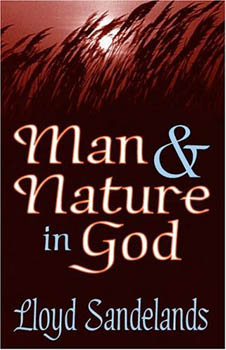
Synopsis
Contemporary American life is tinged with dissatisfaction. Increased
wealth and comfort and technological advances have not made individuals
happier or society more companionable. Today Americans marry later or
not at all, and they fail at marriage as often as they succeed. Man and
Nature in God is a story of contemporary American decadence, a grim tale
of our flagging relation to nature, a tale confirmed at the center of
our sexual lives. Sandelands grounds his critique in a modern
philosophical error. We have conflated a particular metaphysical outlook
- the subjective standpoint of science - with our relationship, as
humans, to nature. We fail to see that however much we may learn about
nature by treating it as object to our subject, we cannot in this way
learn what we most want and most need to know about nature and about
ourselves. Answers to such questions as "How are we related to nature?"
and "How are we to think and act truly in nature" continue to elude us.
Cast as ideology by the "isms" of humanism, naturalism, and mongrel
postmodernism, today's subjective standpoint has turned the question of
truth into a question of politics. The unhappy result has been and
continues to be...
|
|
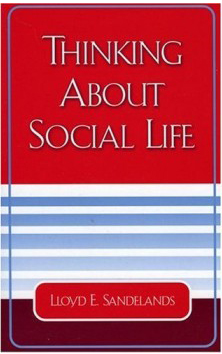
Synopsis
This book is a work of philosophy concerning how we should think about
social life. Whereas social science has traditionally been a study of
social physics (a study of material individuals that interact in time
and space) it must become a study of social life (a study of the vital
forms and feelings of an inherently social species). Working upon an
image of life as a branching tree, the book makes a case for a concept
of social life founded upon a study of three fundamental dynamics: love,
play, and individuation.
|
|
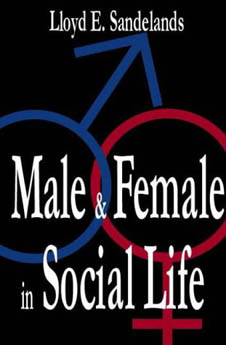 Synopsis Synopsis
Sex is a theoretical puzzle because it is much older than we are. A primary fact of biology, sex has defined society from nearly
the beginning of life on earth, and as a result we cannot see its
effects in our lives in evolutionary comparisons with near primate or
mammalian relatives. Sex is a puzzle, too,
because it is often misconstrued in social science. It is not, as many
social scientists believe, a mere feature of a person, like hair or skin
color. Rather it is a part played in the life of the species. This
propensity to view sex as a personal feature has kept social science
from seeing how sex figures in the social life of the species. Male and
Female in Social Life presents a theoretical framework to describe how
sex (the division of our species between male and female) brings life
and order to society. It argues that sex is the mainspring of social
life and it tells us the most about social dynamics and forms. The book
centers on five chapters that describe four "moments" of human social
life. Following an introduction, chapter 2 begins with the first moment
of social life - unity.
|
|
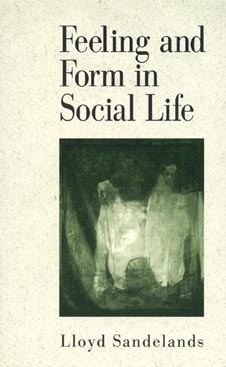 Synopsis Synopsis
Despite the significant contributions of Durkheim, Freud, Kroeber, Mead,
Asch, Giddens, and others, social science remains uncertain about its
founding idea of society. There is little certainty about what, if
anything, is created when people come together in a romantic pair, a
family, a club, a work team, a business corporation, or a nation state,
which only leads to important philosophical problems for social
scientists and practitioners. Feeling and Form in Social Life shows how
a vigorous and practical science of society can be built. Drawing in
part from the philosophy of Susanne Langer, Lloyd Sandelands reveals
human societies to be forms of life known intuitively as feelings of a
whole rather than as observed interactions of persons. These feelings,
which are personal and subjective, are made public and objective by the
uniquely human capacity for artistic abstraction. Through art, people
turn invisible feelings and forms of society into visible objects and
performances that can be shared and studied scientifically. The book
brings this idea of society to life with diverse examples of social
feelings and forms expressed in a stadium chant, folk dance, gift
ritual, tree symbols, photograph, and organization chart. Sandelands
concludes with a powerful discussion of the implications of this idea
for expanding the scope of social science and for resolving its
persistent underlying confusions.
Reviews
"Marvelously argued, this book presents a fundamental challenge to much
of contemporary social science."
- Mayer N. Zald, University of Michigan
"Sandelands' is a wonderfully creative and challenging thesis, virtually
a prolegomenon for new forms of inquiry into organized social life. The
rich and sensitive blending of social science, philosophy, history and
art places it in a class of its own, and will give rebirth to intuition
and the senses in understanding our lives together."- Kenneth J.
Gergen, Swarthmore College, author of Realities and Relationships.
"Sandelands' writing is lively, his observation of social relations is
sympathetic, and his pursuit of understanding is infectious. Students
will be drawn not just to the ideas of sociology and anthropology, but
to a sense of why these fields matter."- Craig Calhoun, New York
University |
| |
|
|
|
University of Michigan |
 Synopsis
Synopsis




